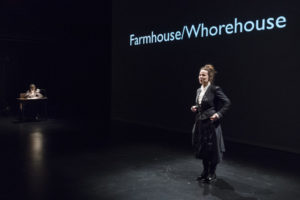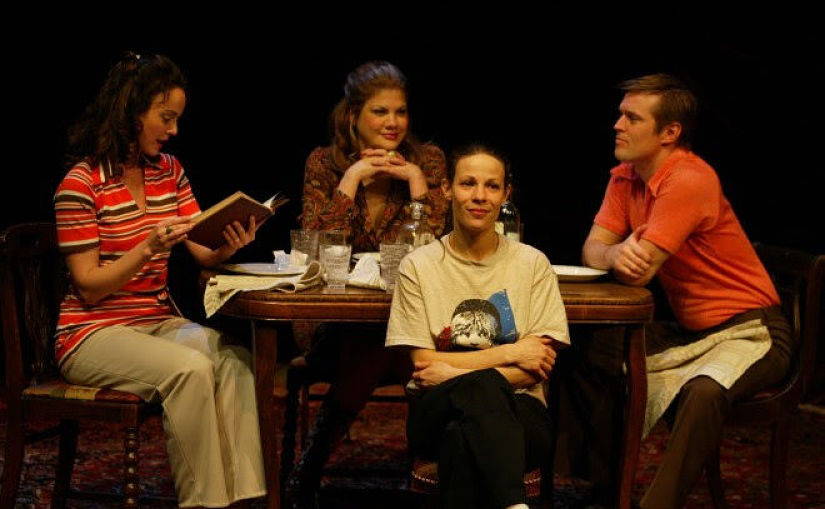She’s not sure how it happened, but Lili Taylor seems to have entered the solo-show portion of her stage career. As she put it to me in an interview this morning, “It’s very strange that I’m in the world of monologues and solos—that’s my little world right now.”
Taylor’s stage career stretches back to her years at Chicago’s Piven Theatre Workshop and includes a stop on Broadway (Marvin’s Room) and several forays Off-Broadway (Three Sisters, Mourning Becomes Electra, The Library), roles she found time for in the midst of a busy screen career. In 2019, Taylor had her first solo stage experience in Suzanne Bocanegra’s Farmhouse/Whorehouse. She’s also working on a self-penned solo show, she said.
But the occasion for our conversation was her performance in Wallace Shawn’s teasing, tendentious fantasia The Fever, which began performances at New York City’s Minetta Lane Theatre and runs through Oct. 24, in a New Group production directed by Scott Elliott; it will also be recorded as an audio play by Audible (joining a growing library of Shawn plays on audio). A surgical examination of economic equality and the merciless, dehumanizing logic of capitalism, The Fever was famously first performed by a dyspeptic, sputtering Shawn in the posh living rooms of friends (I saw him do it at the Museum of Contemporary Art in Los Angeles in 1991). But its provocations play differently, it’s safe to say, as performed by the quicksilver but preternaturally grounded Taylor.
In a Zoom call from her Brooklyn home, Taylor and I spoke about audiences, coffee, and conscience.
ROB WEINERT-KENDT: You joke at the beginning about how there’s not going to be another person coming on to vary things up; it’s just you. I’ve always wondered about actors doing solo plays: Do you think of the audience as your scene partner, in a sense?

LILI TAYLOR: Yes, I do. I think it’s a little easier now that I’m older. I think it would have been a nightmare for me, maybe sent me into a psych ward, when I was younger—just the just the fear of the audience. I used to be afraid of the audience. A lot of actors are. If you look out at one person, and that person is either frowning or having a feeling that has nothing to do with you, it still feels so personal—it can fuck you up. But I’m older now and I’ve been through so much. I’ve been through people screaming at me—in fact, with one of Wally’s plays, Aunt Dan and Lemon, people got up and started screaming at my character, saying, “For shame, For shame.” I’ve gotten used to it, especially with Wally’s plays. I feel a little bit more like a subject, not an object.
There was a walkout right in front of you the night I saw the show, and you handled it graciously, pausing for a second until the couple had left. But that made me wonder, as this show often makes us do, about what world it’s taking place in. Is your character having a mental breakdown in front of us, or is she recounting one?
Great question. We talked about that. At one point Wally was like, “It’s not reality.” But I said, “I know it’s not, but I still need to kind of create some sort of physics of the world, so that it makes sense for me.” I think the thing we settled on is that I’m telling it from a perspective, from hindsight, but I’m also re-experiencing it.
This play, and the character it portrays, are so closely associated with Wally and his distinctive voice and persona. Who is this character to you? Does she have a name?
Her name is the Traveler. I just kept it at that. I think there’s maybe a reason why I didn’t give her name. It’s funny, now that I’ve been doing this 30 years, I know a thing or two—that sometimes there might be actually some deeper reason why I do the things I do. Rather than thinking, “Oh, I shouldn’t have done that,” or “What’s wrong with me?” it’s just trusting things that happen in the process, and there are good reasons sometimes. So I bet there’s a good reason why I didn’t name her.
I don’t know what your training was, and if you do or don’t like to talk about your process…
I love to talk about it.
Great, that makes you a journalist’s favorite kind of actor. So do you usually come up with a whole bio for your characters? Did you used to do that more?
I started doing that, because that’s what they taught me to do. But after about 10 years, I realized it didn’t have any meaning for me. It wasn’t working. It felt like it was bogging me down. What I really found I needed to do was to approach each role as if it was the first time I’d ever done anything. And so really seeing what each one needed; maybe this one didn’t need a bio, maybe this one did. Maybe this one needed something very different. It’s very scary. I think of my friend Frank Langella, before we started rehearsing something, he extended his hand to me and said, “Dear, shall we leap empty-handed into the void?” That’s kind of what it’s like starting each project. It’s a leap. It’s going in empty-handed, and it feels like a void. It’s scary. It’s the unknown. Getting into that state in itself is a huge part of the process.
Emptying yourself to prepare to be filled by the role?
Exactly, and trusting that the character is going to let you know what she needs—to trust that and not to impose things onto her.
I wonder whether you feel there are certain things in The Fever that play differently given the gender change. I noticed, for instance, the part where Wally writes about living in his mind and not thinking of himself as having a body—I don’t want be a gender essentialist about this, but that sounds different coming from a woman.
That’s a very good point. But my dad—we had The New Yorker all over the house, and he went to Dartmouth, he was a poet. He loved literature. So in some ways I could identify with what Wally was talking about a little bit. I can also identify because I started therapy when I was when I was 13.
So you’re no stranger to self-examination. That’s a great segue to ask how much you do or don’t identify with the socioeconomic class of the show’s character, who is a privileged city dweller, an “aesthete” who seems to live at dinner parties and concerts.
I grew up in one of the richest suburbs in United States, but we didn’t have as much money. We weren’t poor by any means—we were middle-class—but we I felt like we didn’t have money compared to all my friends, who were very, very wealthy. It’s Ordinary People Land. I also knew that in 1980, I think $9,000 per student was spent in my high school, while in the Bronx, it was probably, you know, $700. So I knew that I was considered a value to society, and that people and the kids in the Bronx were not.
But what I love about Wally’s play is that I think it’s deep enough and specific enough for everyone to find a way in, even if you don’t even know what the hell Marx is or you didn’t grow up like Wally did. I know somebody who was working-class who would probably be able to identify with this piece, because it’s about need to consume—about the way we expect externals to make ourselves feel better inside, to fill ourselves up.
The thing that’s really uncomfortable about the play, and you really lean into this, is not just the content but the sense of complicity—the way the character talks about “the poor” as an unknowable other, and assumes that “we” in the theatre are obviously the well off who benefit from the poor’s misery and are blind to it. There’s a long passage where the character uses “you” to accuse herself and her class of myriad atrocities, and she means us.
But then sometimes she changes that, and she’s talking to the poor person as “you,” which is very strange. That’s Wally! What you’re describing is fucking Wally Shawn.

The question is, do we take the show’s prophetic critique of Western materialism at face value? Is this Wally’s version of what Jesus said—to sell your possessions and give the proceeds to the poor? Or are we meant to hear this, take it in, and go have a nice drink?
Wally has said there’s no answer. Also, I really don’t like to proselytize, and I don’t I don’t like to be proselytized to. The minute someone tells me what to do, I shut down; I’m “fuck you,” you know? So I was really working with not doing that, so that we could stay open. If I could keep it in the realm so that nobody is getting defensive or feels, you know, like, “Why are you telling me this?” If they can stay open, and then see what questions do arise, and leave the theatre, they might think: Are there any areas in my life where I could be more conscious of where I’m being sentimental—having false sympathy but not doing anything about it? Are you looking to see where your money’s invested? What actions are you taking? And if you’re not, then it’s just: Get conscious.
We live in a time where there’s no way we can be conscious of every fucking thing. Like, for instance, I’m a birder. But I know that coffee is a major problem for birds in South America and Central America. I drink a lot of coffee; I am not ethical about my coffee drinking. I think about how it’s impacting those birds, but I don’t know what to do. We just live in a world where there’s just too many too many interconnections, and we’re seeing that right now with the supply chain. There are no easy answers. I guess all we can do is try to get as conscious as we can in our life.
The last thing I wanted to ask is, how has the pandemic been for you? This is your first live performance since last year, right?
It is. And it feels so nice doing it with Wally and Scott; they’re like a family. Wally obviously loves people. And he wrote that new beginning for me, where I’m just acknowledging that we’ve all been through something, and it’s nice to see everybody. With the pandemic, I just feel like we all are sharing a common bond. That’s, that’s my main feeling from the pandemic; in some ways, I feel more connected to everybody. Like, I had an exchange with one of the CVS guys, in the thick of the pandemic, and we just looked at each other and we knew exactly what we were feeling. We knew we were in something together. That’s pretty cool, to be in something together.
Rob Weinert-Kendt (he/him) is the editor-in-chief of American Theatre. rwkendt@tcg.org
"how" - Google News
October 15, 2021 at 02:18AM
https://ift.tt/2YRsjZK
How Lili Taylor Caught Wallace Shawn's 'Fever' - American Theatre
"how" - Google News
https://ift.tt/2MfXd3I
https://ift.tt/3d8uZUG
Bagikan Berita Ini














0 Response to "How Lili Taylor Caught Wallace Shawn's 'Fever' - American Theatre"
Post a Comment